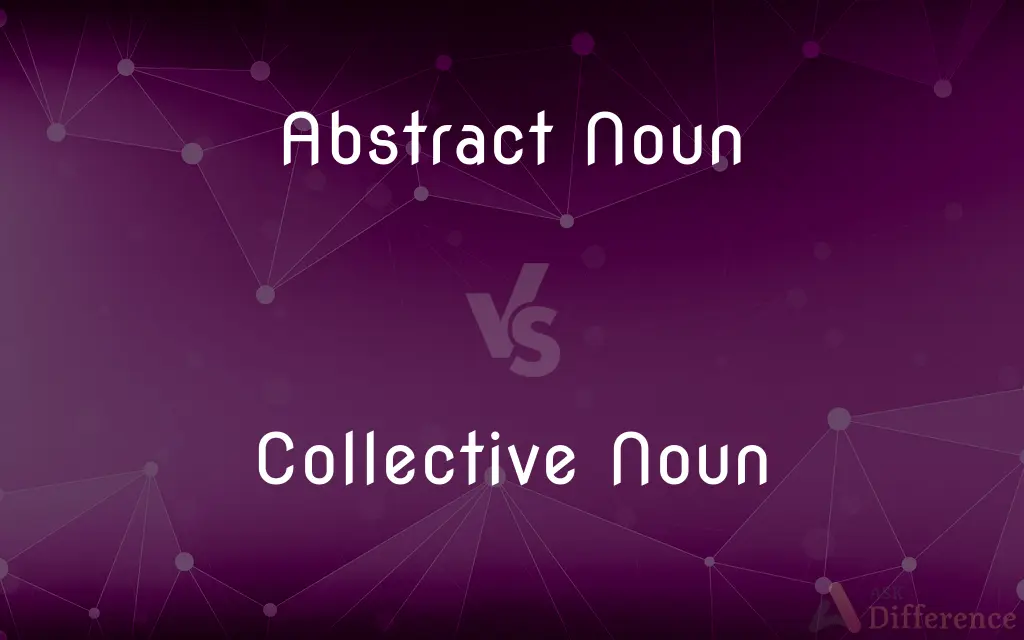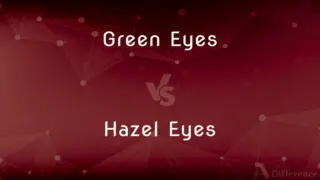Abstract Noun vs. Collective Noun — What's the Difference?
By Tayyaba Rehman — Published on November 1, 2023
Abstract Nouns denote intangible concepts (e.g., happiness); Collective Nouns refer to groups of individuals/objects (e.g., team).

Difference Between Abstract Noun and Collective Noun
Table of Contents
ADVERTISEMENT
Key Differences
Abstract Nouns represent ideas or concepts that cannot be touched or seen, things that do not have a physical existence. On the other hand, Collective Nouns are used to describe a group or collection of individuals, animals, or things.
Abstract Nouns can be feelings, qualities, or characteristics. For instance, "anger" or "beauty" cannot be held in your hand or seen with your eye. In contrast, Collective Nouns, while referring to multiple entities, are singular in form; for example, "a flock of birds" or "a bundle of sticks."
Abstract Nouns are often used in instances where emotional or intellectual concepts are discussed. These nouns are not concrete or tangible. Collective Nouns, however, provide a convenient way to talk about groups in a single word, even though they represent more than one person or object.
Abstract Nouns are uncountable because they represent holistic concepts. You wouldn't say "two justices," for instance. But, Collective Nouns, despite representing multiple entities, are treated as singular nouns in a sentence construction: "The team is playing tonight."
Both Abstract Nouns and Collective Nouns serve to categorize different types of nouns. However, while Abstract Nouns categorize by removing physicality, Collective Nouns categorize by bringing individual elements together into a group.
ADVERTISEMENT
Comparison Chart
Definition
Names an intangible concept
Names a group of individuals or objects
Tangibility
Intangible
Represents tangible items
Examples
Feelings, ideas (happiness, justice)
Group terms (flock, bundle, team)
Grammatical Treatment
Generally uncountable
Singular in form but plural in meaning
Use in a Sentence
Used to express conceptual ideas
Used to describe a group as a single unit
Compare with Definitions
Abstract Noun
A noun denoting an idea, quality, or state.
Honesty is crucial for trust.
Collective Noun
A term for a collection of people, animals, or objects.
The class was excited about the trip.
Abstract Noun
A term for something that cannot be sensed.
Her courage was evident in her actions.
Collective Noun
A singular noun used to refer to a group as one unit.
The team was united in their effort.
Abstract Noun
A noun that represents an intangible concept.
Justice is a principle that everyone appreciates.
Collective Noun
A word describing a group or assembly.
A flock of birds took to the sky.
Abstract Noun
A category of nouns depicting non-material ideas.
Freedom is essential for personal development.
Collective Noun
A noun that denotes a group of individuals or things.
A herd of elephants roamed the savanna.
Abstract Noun
A word for a concept that doesn't have a physical existence.
Love knows no boundaries.
Collective Noun
A noun that represents multiple entities as one.
The audience was captivated by the speaker.
Common Curiosities
Do Collective Nouns always refer to people?
No, Collective Nouns can refer to groups of animals, things, or people.
Are Abstract Nouns countable?
Generally, no. They represent holistic concepts.
Is a Collective Noun considered singular or plural?
It's singular in form but refers to a group.
Are emotions considered Abstract Nouns?
Yes, they denote intangible feelings.
Can Abstract Nouns become tangible?
No, they represent ideas or qualities, not physical items.
Are all non-physical things considered Abstract Nouns?
Generally, if they represent ideas, qualities, or states.
Can Abstract Nouns be physically touched?
No, Abstract Nouns represent intangible concepts.
What's an example of a Collective Noun?
An example is "choir," a group of singers.
Can you give an example of an Abstract Noun?
Sure, "freedom" is an Abstract Noun.
Can an Abstract Noun be a subject of a sentence?
Yes, e.g., "Happiness is contagious."
Can a Collective Noun represent inanimate objects?
Yes, like "a set of keys."
What's the difference between Abstract and Collective Nouns?
Abstract Nouns denote intangible concepts; Collective Nouns refer to groups.
Can you use numbers with Collective Nouns?
No, because they are singular in form but plural in meaning.
Does a Collective Noun require a plural verb?
In American English, it typically takes a singular verb.
Can animals be referred to using Collective Nouns?
Yes, like "a pack of wolves."
Share Your Discovery

Previous Comparison
Participant vs. Contestant
Next Comparison
Green Eyes vs. Hazel EyesAuthor Spotlight
Written by
Tayyaba RehmanTayyaba Rehman is a distinguished writer, currently serving as a primary contributor to askdifference.com. As a researcher in semantics and etymology, Tayyaba's passion for the complexity of languages and their distinctions has found a perfect home on the platform. Tayyaba delves into the intricacies of language, distinguishing between commonly confused words and phrases, thereby providing clarity for readers worldwide.












































